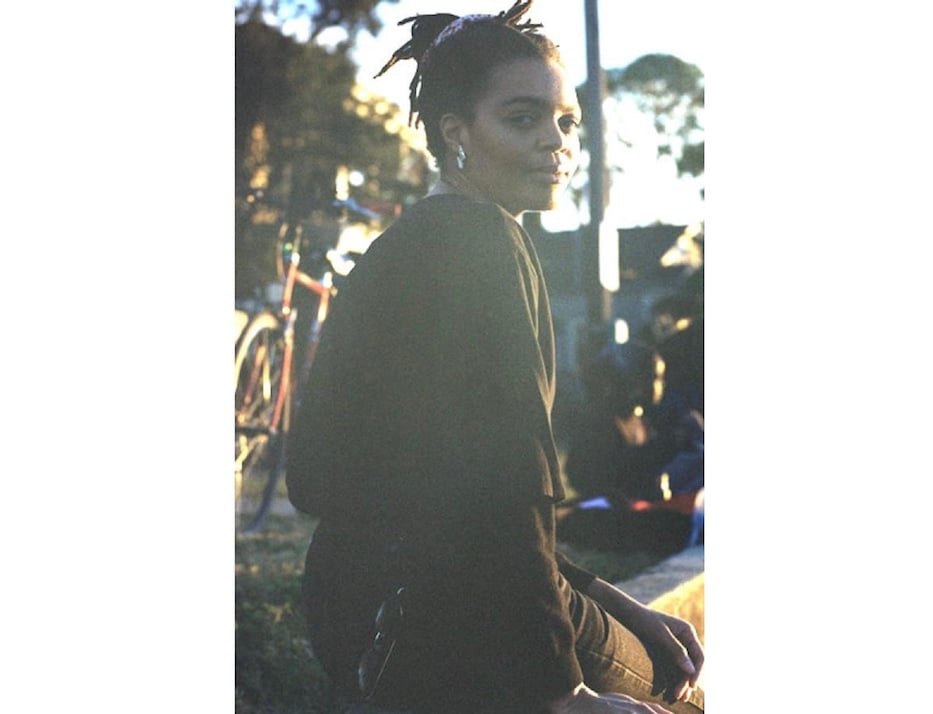
Dance | International Festival of Arts & Ideas | Music | Poetry | Arts & Culture | National Endowment for the Arts | New Haven Symphony Orchestra | Yale Rep Theatre
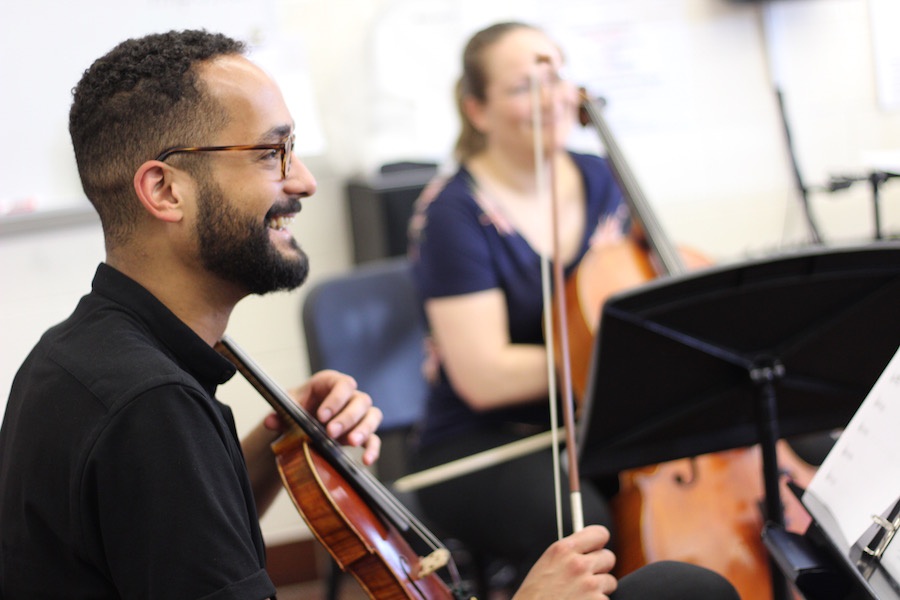
James Keene, who was a Harmony Fellow with the New Haven Symphony Orchestra in 2018. Lucy Gellman File Photo.
A concert dedicated to Black women composers, suffused with centuries of New Haven music history. A dance performance that folds in ability in all its forms—and dovetails with a book the whole city is invited to read. A Greek myth, set amidst the hustle and bustle of present-day Los Angeles and brought to life on a New Haven stage.
Those are a few of the projects to receive National Endowment for the Arts (NEA) funding this month, for a total of $55,000 in federal dollars to the New Haven Symphony Orchestra (NHSO), International Festival of Arts & Ideas, and Yale Repertory Theatre. The three were awarded $15,000, $10,000, and $30,000 respectively.
Poet Imani Elizabeth Jackson, who lives in the city’s Fair Haven Heights neighborhood, has been named one of 36 NEA Creative Writing Fellows, an award that carries $25,000 in unrestricted funding.
“Together, these grants show the NEA’s support nationwide for strengthening our arts and cultural ecosystems, providing equitable opportunities for arts participation and practice, and contributing to the health of our communities and our economy,” said NEA Chair Maria Rosario Jackson in a recent press release from the organization. “I encourage everyone to explore these projects and the ways they help provide inspiration, understanding, and opportunities for us to live more artful lives.”
The NEA awarded a total of $279,000 to 18 Connecticut organizations, including the City of Hartford, City of Stamford, Greater Connecticut Youth Orchestras, Lyman Allyn Art Museum and Thrown Stone Theatre Company among others. View a full list of recipients by state here.
In New Haven, those dollars will fuel performances in dance, music, and theater in the first half of the year. On York Street, the Yale Repertory Theatre is already hard at work on Mojada, Luis Afaro’s timely adaptation of Euripides’ Medea, scheduled to open in March. The grant supports all aspects of the production, from hiring artists to building new setpieces for the show.
The last in a trilogy that also includes Electricidad and Oedipus El Rey, Mojada takes the bones of Greek tragedy, and transplants them onto present-day Los Angeles, folding in a story of history, heritage, immigration and the politics and of belonging in a country built on stolen land. At its core is a Mexican family, whose matriarch bears the same name as Euripides’ central and tragic character.
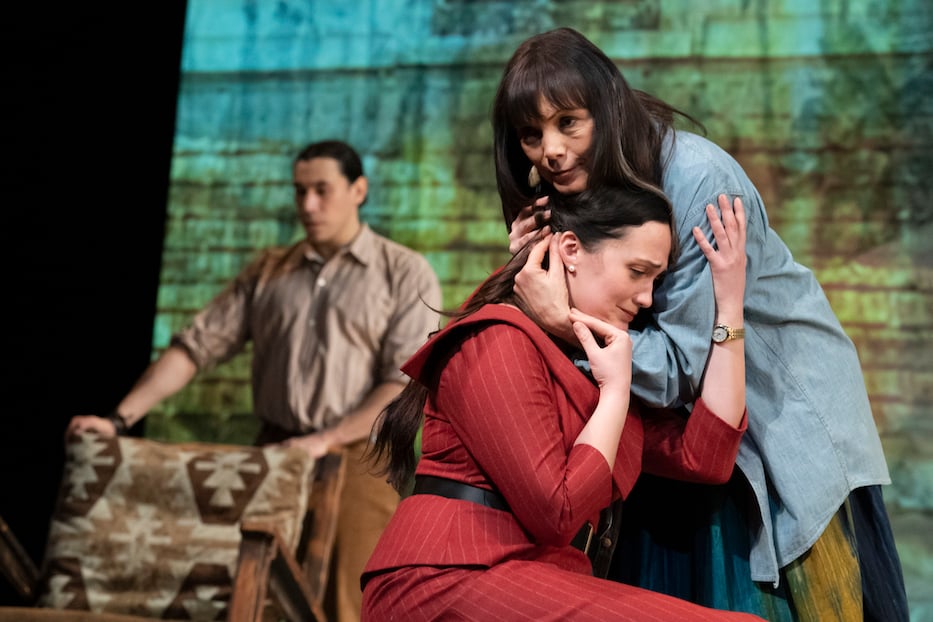
Lily Gladstone and Carla-Rae in Manahatta by Mary Kathryn Nagle, directed by Laurie Woolery, Yale Repertory Theatre, 2020. Photo by Joan Marcus.
At the Rep, it will be directed by Laurie Woolery, whose recent New Haven credits also include Dream Hou$e at Long Wharf Theatre and Manahatta and El Huracán at the Yale Rep. Jennifer Kiger, associate artistic director and director of New Play Programs at Yale Repertory Theatre, said that artistic staff are extremely excited for the show, and hopeful that it will resonate with audiences across New Haven and the region.
“It’s [New Haven is] a small city with a growing Latine community,” she said in a phone call Thursday afternoon. “Luis’ writing is urgent, it’s relevant, it’s poetic, it's lyrical, it brings in folklore but it’s also very contemporary.”
The theater will also be welcoming back New Haven Public Schools students for its Will Power! program, which seeks to spark dialogue and build curricular development through theater. In the program, students come for special matinee performances, and then stay for a talkback with actors and artistic staff. “We are brimming with excitement,” Kiger said.
Elsewhere in the city, the New Haven Symphony Orchestra (NHSO) is folding that funding into its final performance of the season. Scheduled for May 12 at Southern Connecticut State University, the concert is dedicated to the work of Black composers Florence Price, Margaret Bonds, Helen Hagan and Quinn Mason. Only Mason is still living.
“We really want to engage the community again,” said NHSO Chief Executive Officer Elaine Carroll, adding that she sees the grant as a recognition of the work the NHSO is doing to reflect the “richly diverse city” that is its longtime home. After a series of pivots, Carroll praised SCSU for partnering with the symphony this and last year, which has allowed it to build out a robust season.
During their lifetimes, Price, Bonds, and Hagan all struggled to receive recognition; all three still do in most musical circles. Price’s work largely disappeared until 2009, when a couple found dozens of her manuscripts in an abandoned house on the outskirts of Chicago. Bonds, who the NHSO fêted in a concert at the Canal Dock Boathouse in July 2021, appears infrequently on programs. And Hagan, whose childhood brought her to New Haven in the 1890s, remains largely unknown and unperformed despite recent work to right her legacy, including a 2021 citation in the Congressional record.
In a phone call Thursday, Carroll called it a full-circle sort of moment for the symphony, which opened its season with Joel Thompson’s To Awaken the Sleeper last October. Since 2015, the NHSO has been working to amplify Hagan’s legacy in New Haven, which included years directing music at the Dixwell United Church of Christ and making history as the first Black woman to attend (and later graduate from) the Yale School of Music in 1910.
But by her death in 1964—after which she was buried in an unmarked grave in Evergreen Cemetery—Hagan had largely faded from view, and much of her work was lost.
Last year, the NHSO began working closely with composer Dante Anzolini to arrange and orchestrate Hagan’s “Piano Concerto No. 1, Mvt. 1,” of which there was only a partial surviving score. It will mark a world premiere of the piece. It’s personal for Anzolini, who served as artistic director at Dixwell UCC during his years at the Yale School of Music.
Carroll added that the concert feels like an overdue celebration of not just these composers, but of the extraordinary and largely untold lives they lived. Three years ago, Price’s “Symphony No. 1 in E Minor” was part of the symphony’s final concert before Covid-19 hit New Haven in March 2020. She’s excited to pair her work with new revelations around Hagan’s oeuvre, as well as Mason’s explosive A Joyous Trilogy.
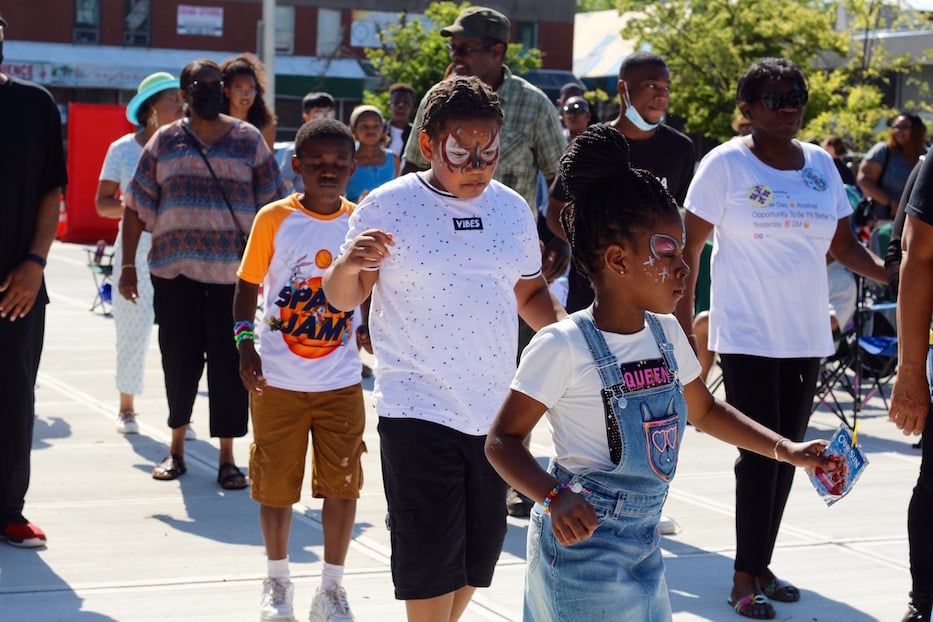
Kids dancing at the Dixwell neighborhood festival, a collaboration with the International Festival of Arts & Ideas, last summer. Lucy Gellman File Photo.
Then this summer, the International Festival of Arts & Ideas will put NEA funds toward a dance performance connected to Sitting Pretty: The View from My Ordinary Resilient Disabled Body, which the festival has selected as its “big read” book for the summer. In the book, author Rebekah Taussig probes what it means to be disabled both for herself, and within a society where disability has often been depicted as either horror or hindrance.
“We will be listening to learning from artists with disabilities,” both those that are visible and those that are not visible, said Executive Director Shelley Quiala in a phone call Thursday afternoon.
While she did not disclose the name of the dance company—the festival has not yet released its 2023 summer lineup—she did say that it is an “integrated” group, meaning that it has dancers of multiple abilities on stage at any given time.
“I believe strongly in using arts experience to support the fullness of humanity of artists, and being sure that artists are telling a story that is their story,” she said. “We create the container, and artists come and say, ‘This is the story I want to tell and this is why it's important.”
Quiala also noted that arts organizations across the country are experiencing “a need for additional funding” that is profound. In March of last year, the National Endowment for the Arts requested a $203 million budget for the 2023 fiscal year. It received $207 million—an increase that still amounts to less than .01 percent of the federal budget.
France, by comparison, is smaller than the state of Texas but allocated nearly four billion euros to arts and culture funding last year, including a cultural stipend for 18-year-olds.
“It reminds me how much of a need there is for additional funding,” she said after looking over the list of NEA grantees. “We have to be multifaceted in the way we fundraise and arts and humanities.”
“It’s A Lot of Breathing Room”
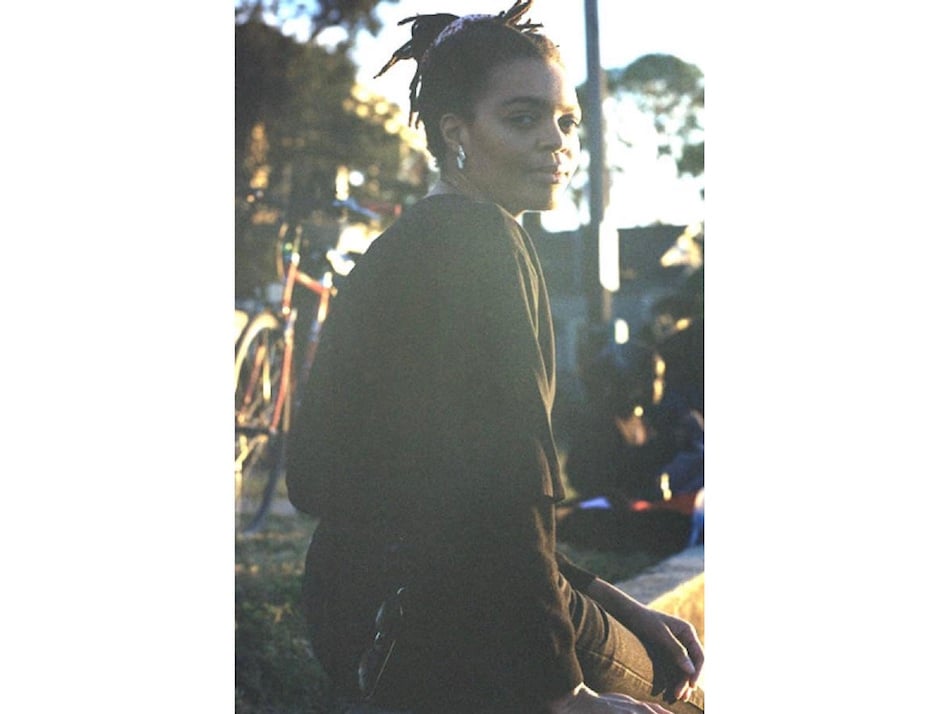
S*an D. Henry-Smith Photo Courtesy of the Poet.
For Jackson, the creative writing fellowship is a “huge relief”—and a support that she wishes were available to more working artists. A part-time grant writer at Artspace New Haven, she knows how hard it can be for working artists to make ends meet and still find time for their craft.
“The beauty of the NEA grant is that it’s unrestricted,” she said, adding that she’s realized as a grant writer how uncommon that still is. “It’s really just a gift for living.”
Born and raised in Chicago, Jackson began writing under the watchful eye of her aunt Angela Jackson, a former NEA fellow who last year was named the fifth poet laureate of Illinois. As a kid and later a young adult, Jackson would bring her work to her aunt, and receive the guidance and encouragement she needed to continue.
After studying religion at Reed College—it was a course from poet Samiya Bashir that sent her back to writing—Jackson moved back to Chicago for five years, then to Providence for her master of fine arts at Brown University. Her partner’s studies at the Yale Law School brought her to New Haven a year and a half ago.
“A lot of my writing is sort of thinking about Black presence in the environment,” she said in a phone call Thursday afternoon. For her, that means thinking about water, rivers, tidal basins, and the part of the country where she now lives, where “the land itself is a historical record.”
With the forthcoming release of her book, Flag, from Futurepoem Books, she said she would like to travel within the region, growing her body of work as she studies the topography of the area. Now, she can—and not worry that she won’t be able to make rent or pay for basic expenses. She recalled getting the news on a particularly stressful day, and feeling immediately like a weight had been lifted.
“It’s a lot of breathing room,” she said.
View a full list of recipients by state here.

